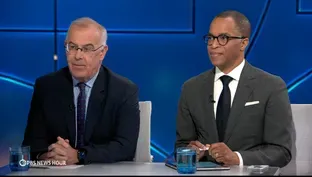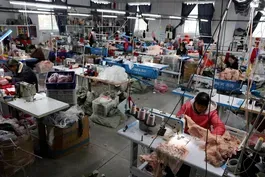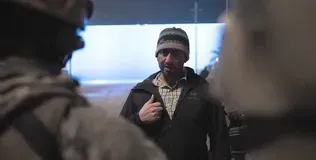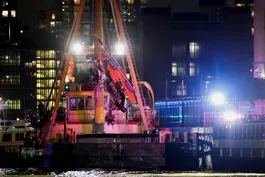
Judge rules Trump administration can deport Khalil
Clip: 4/11/2025 | 11m 39sVideo has Closed Captions
Immigration judge rules Trump administration can deport Columbia protestor Mahmoud Khalil
A Louisiana immigration judge ruled that the Trump administration can deport Mahmoud Khalil, a Columbia grad student detained last month for his role in campus protests against the war in Gaza. Khalil has not been charged with a crime and the administration is trying to remove him through a Cold War immigration law. Laura Barrón-López discussed more with immigration attorney David Leopold.
Problems with Closed Captions? Closed Captioning Feedback
Problems with Closed Captions? Closed Captioning Feedback
Major corporate funding for the PBS News Hour is provided by BDO, BNSF, Consumer Cellular, American Cruise Lines, and Raymond James. Funding for the PBS NewsHour Weekend is provided by...

Judge rules Trump administration can deport Khalil
Clip: 4/11/2025 | 11m 39sVideo has Closed Captions
A Louisiana immigration judge ruled that the Trump administration can deport Mahmoud Khalil, a Columbia grad student detained last month for his role in campus protests against the war in Gaza. Khalil has not been charged with a crime and the administration is trying to remove him through a Cold War immigration law. Laura Barrón-López discussed more with immigration attorney David Leopold.
Problems with Closed Captions? Closed Captioning Feedback
How to Watch PBS News Hour
PBS News Hour is available to stream on pbs.org and the free PBS App, available on iPhone, Apple TV, Android TV, Android smartphones, Amazon Fire TV, Amazon Fire Tablet, Roku, Samsung Smart TV, and Vizio.
Providing Support for PBS.org
Learn Moreabout PBS online sponsorshipAMNA NAWAZ: Welcome to the "News Hour."
Today, an immigration judge in Louisiana ruled that the Trump administration can deport Mahmoud Khalil, a Columbia University graduate student and legal permanent resident who was detained last month for his role in campus protests against the war in Gaza.
Judge Jamee Comans said the government met its burden of evidence to support the determination that Khalil poses adverse foreign policy consequences for the United States, despite not being charged with a crime.
Our White House correspondent, Laura Barron-Lopez, has been covering this and joins me now.
So, Laura, the judge has decided that Khalil can be deported.
He won't be immediately deported, though.
Explain that and what happens next.
LAURA BARRON-LOPEZ: So the reason he won't be immediately deported is because there's two tracks happening at the same exact time, Amna.
Right now, there are the immigration court proceedings in Louisiana.
And that's the judge we heard from today, ruling that he can be deported.
And Khalil's lawyers are going to appeal that ruling today in immigration court seeking relief.
Now, at the same time, there is a federal judge in New Jersey that as early as today, because there's a hearing occurring today, as early as today, that federal judge in New Jersey could decide whether Khalil must be released from detention, where he's currently being held in Louisiana.
I spoke to Khalil's lawyer, Baher Azmy, and he said that the federal court is where that constitutional question is going to be answered and that they are confident that the federal judge will not accept the Secretary of State Marco Rubio's determination at face value.
And the lawyers essentially hope that Khalil can be released while that constitutional question about his freedom of speech protections will play out in federal court.
AMNA NAWAZ: All right, late yesterday the Supreme Court ruled on another major immigration case I know you have been following.
They said the administration must facilitate the return of Kilmar Abrego Garcia.
That's a Maryland man who was wrongfully deported to El Salvador last month.
What's the latest on that?
LAURA BARRON-LOPEZ: So, just as a reminder, the Justice Department admitted in a court filing just a few weeks ago that they wrongfully deported Garcia based on -- quote -- "an administrative error."
Now, Garcia is a father who has protected legal status.
And the judge repeatedly said today, asked the administration specifics about what they had done so far to attempt to bring Garcia back to the United States from El Salvador.
And the Justice Department did not provide any answers there.
The judge also grew frustrated when asking the Trump administration lawyer for basic details about Alberto Garcia's location.
Where exactly is he?
And that exchange was highlighted by Garcia's lawyers today.
SIMON SANDOVAL-MOSHENBERG, Attorney For Kilmar Abrego Garcia: That was the most shocking thing of all, that the attorney for the government wasn't even prepared to answer the question, where is Kilmar Abrego today and what is his custodial status?
I was very dismayed and disheartened by the fact that they wouldn't answer such a straightforward question.
LAURA BARRON-LOPEZ: The Trump administration has been extremely defiant in this case, Amna.
They have been fighting essentially bringing back Garcia to the United States, saying that they just have to facilitate it, not effectuate it.
And it's unclear what exactly facilitation means.
Now, Abrego's lawyer was incredulous, as you heard there, and also said that they were confused as to why there had been many hours since the Supreme Court's ruling and yet the government appeared to not be doing much to bring Garcia back to the United States.
AMNA NAWAZ: So, Abrego Garcia was here with legal protected status.
Khalil was here, as you mentioned, as a legal green card holder.
Are we seeing the Trump administration go after more people with legal status here in the States?
LAURA BARRON-LOPEZ: We are.
We have seen hundreds of students who have visas who have then had their visas revoked by the Trump administration in recent weeks.
And many of them have said that they aren't given explanations as to why.
They have not been charged with crimes, like Khalil has not.
And also this week, Homeland Security announced that they are increasing surveillance on immigrants.
They said that they're monitoring immigrant social media to root out antisemitism.
And this is all happening as temporary protected status, another form of legal protection, is essentially hanging in the balance.
And on that front and on the wider anti-immigration agenda, I spoke to David Leopold.
He's an immigration attorney and former president of the American Immigration Lawyers Association.
And we talked about President Trump's larger anti-immigration agenda and the administration's campaign to convince immigrants to self-deport.
David Leopold, thank you so much for joining us.
There's been a flurry of court action in the last 24 hours.
And the Supreme Court ordered the Trump administration to -- quote -- "facilitate" the return of Kilmar Abrego Garcia from El Salvador.
That's different wording than the lower court used, which was to effectuate his return from El Salvador.
So what does this mean?
I mean, what exactly can the court compel the administration to do in this case?
DAVID LEOPOLD, Former President, American Immigration Lawyers Association: Well, listen, I have handled cases where people have been deported improperly.
And the court has the authority and the jurisdiction to order a person who's improperly, unlawfully deported back.
And we know that Mr. Garcia, who was living his life, children, was arrested when his son, his special needs son, was in the car, was unlawfully deported.
The government has -- the Trump administration has admitted the mistake.
And the fact that they're not effectuating, facilitating, getting him back here right now tonight is just astounding to those of us who respect the rule of law, which is the country.
LAURA BARRON-LOPEZ: In another case, a judge said that the administration could move forward with creating an immigrant registry, requiring all foreign nationals who've been in the U.S. more than 30 days to register with the federal government.
Karoline Leavitt, White House press secretary, addressed today's deadline for migrants to register.
KAROLINE LEAVITT, White House Press Secretary: As President Trump and Secretary Noem have both said, if you register and you leave now, you choose to self-deport, you may have the opportunity to return later legally.
But if not, you will be arrested, fined, deported, never to return to our country again.
LAURA BARRON-LOPEZ: David, who does this apply to?
And is the administration's overall goal here to convince undocumented migrants and potentially some legal immigrants to self-deport?
DAVID LEOPOLD: Well, look, this whole use of the registry, the registry -- a registry has always been part of the law.
I think what's going on here is most of the undocumented immigrants in this country, these are the people that put food on our table.
These are the people that take care of our moms and our dads who are in assisted living.
These are the people who got us through the pandemic.
Trump at that time five years ago called them essential workers, because that's what they are.
And most of these folks are just working hard and trying to make it.
The problem they have got is that the law has never been fixed and there is no lawful pathway for them to get their U.S. passports and their citizenship.
So what the Trump administration appears to be doing is using the registry law to criminalize people, taking people who are not -- who are law-abiding, hardworking folk, and giving them some technical criminal violation.
It's just awful.
LAURA BARRON-LOPEZ: I want to ask you about those - - the cancellation of those Social Security numbers for some 6,000 immigrants living in the U.S. that you mentioned.
The administration did it by moving them to the agency's death master file, taking away a key form of tax identification.
So what does this mean for those immigrants, practically?
DAVID LEOPOLD: Well, it's, yes, a good question.
Look, immigrants pay roughly $25.7 billion every year in Social Security taxes.
So let's start there.
What is the object here?
What is the -- what is the gain the administration is going to get by taking that kind of money out of the Social Security system every year?
What the administration is doing is it's doing in other areas is, it's weaponizing -- it's weaponizing Social Security.
It's weaponizing it against immigrants.
And it's an invasion of privacy.
Don't think that it's going to stop with immigrants' Social Security numbers.
They're going to be going through -- government bureaucrats going through a Social Security system that has all of our numbers in there and all of our privacy information and all of our data.
And this comes at a time when our seniors -- our seniors are terrified.
Because of the cuts that are coming to the Social Security Administration and other administrations -- other agencies within the federal government, they're terrified they're not going to be getting their benefits, and with good reason.
And now they're going to go in and they're going to invade privacy?
And we know, we know that mistakes are going to be made.
What's going to happen when American seniors start losing their benefits because they get improperly put into what they call the death row or the death registry or whatever they call it, and they stop getting their payments?
What's going to happen when privacy is invaded and people's information that they assumed that they, for generations, was going to remain private is opened up by government bureaucrats who are making mistakes and getting into the wrong files?
LAURA BARRON-LOPEZ: There were a number of other developments on immigration today.
A judge denied a request to immediately stop the administration from carrying out deportation raids at churches.
And this is all as the administration is moving to strip away legal status from many immigrants.
Their efforts to revoke protected status for hundreds of thousands of Latin American migrants is being halted.
But, despite that, Homeland Security today move forward with stripping temporary protected status from some 10,000 people from Afghanistan and Cameroon.
What are you telling your clients, David, whether they're undocumented or they're legal immigrants?
DAVID LEOPOLD: Well, look, we're in an unprecedented situation.
I mean, we have never seen an attack like that -- like this from all fronts against people who are in the country legally.
Those Afghans that you mentioned, the Venezuelans, others, they're here in this country legally.
They came legally.
And so what this administration is doing is, it's taking the lawful status away and making them unlawful.
And they're doing it in a particularly cruel way.
We know what happens to people who go back to Afghanistan.
The Taliban still operates there.
I have had clients flee the Taliban and wind up in the United States on special visas.
This is just absolutely cruel.
And it's outrageous to be sending people back to possible -- well, I don't want to think of the consequences, death, imprisonment.
It's not clear to me what the objective is here, what the objective is, to take people who have come to this country lawfully -- let's reemphasize that -- and to then strip them of that lawful status and then start trying to remove them from the United States.
LAURA BARRON-LOPEZ: Immigration lawyer David Leopold, thank you so much for your time.
DAVID LEOPOLD: Thank you.
Brooks and Capehart on Trump’s tariffs and market reaction
Video has Closed Captions
Clip: 4/11/2025 | 11m 2s | Brooks and Capehart on Trump’s tariffs and reaction from the markets (11m 2s)
China raises tariffs on U.S. imports in trade war escalation
Video has Closed Captions
Clip: 4/11/2025 | 2m 58s | China raises tariffs on U.S. imports in latest escalation of trade war (2m 58s)
Former Navy SEAL on 'Warfare' and its depiction of combat
Video has Closed Captions
Clip: 4/11/2025 | 6m 9s | Former Navy SEAL on making the new film 'Warfare' and its authentic depiction of combat (6m 9s)
How Trump's trade war is impacting U.S. and global economies
Video has Closed Captions
Clip: 4/11/2025 | 7m 2s | How Trump's tariffs and trade war are impacting U.S. and global economies (7m 2s)
News Wrap: Tourist helicopter crashes in Hudson River
Video has Closed Captions
Clip: 4/11/2025 | 5m 24s | News Wrap: Investigators search for cause of tourist helicopter crash in New York (5m 24s)
Patriotism takes hold in Taiwan amid threat from China
Video has Closed Captions
Clip: 4/11/2025 | 6m 29s | Patriotism takes hold in Taiwan in face of growing threats from China (6m 29s)
Providing Support for PBS.org
Learn Moreabout PBS online sponsorshipSupport for PBS provided by:
Major corporate funding for the PBS News Hour is provided by BDO, BNSF, Consumer Cellular, American Cruise Lines, and Raymond James. Funding for the PBS NewsHour Weekend is provided by...

















